For additional information, write to:
Krishnamurti Foundation Trust, Ltd.
Brockwood Park, Bramdean, Hants, S024 0LQ England
or
Krishnamurti Foundation of America
P.O. Box 1560
Ojai, CA 93023, United States
Sources and acknowledgments can be found .
Series editor: Mary Cadogan
Associate editors: Ray McCoy and David Skitt
ON RELATIONSHIP . Copyright 1992 by Krishnamurti Foundation Trust, Ltd. and Krishnamurti Foundation of America. All rights reserved under International and Pan-American Copyright Conventions. By payment of the required fees, you have been granted the non-exclusive, non-transferable right to access and read the text of this ebook on-screen. No part of this text may be reproduced, transmitted, down-loaded, decompiled, reverse engineered, or stored in or introduced into any information storage and retrieval system, in any form or by any means, whether electronic or mechanical, now known or hereinafter invented, without the express written permission of HarperCollins ebooks.
Library of Congress Cataloging-in-Publication Data
Krishnamurti, J. (Jiddu), 18951986
On relationship / J. Krishnamurti. 1st ed.
p. cm.
ISBN 0-06-250608-0 (alk. paper)
1. International relations. I. Title.
HM132.K72 1992
302dc20
9155330
CIP
06 05 04  / RRD H 20 19 18 17 16 15 14 13
/ RRD H 20 19 18 17 16 15 14 13
EPub Edition JULY 2013 ISBN: 9780062311955
The problem is not the world, but you in relationship with another, which creates a problem; and that problem extended becomes the world problem .
Colombo
25 December 1949
J IDDU K RISHNAMURTI was born in India in 1895 and, at the age of thirteen, was taken up by the Theosophical Society, which considered him to be the vehicle for the world teacher whose advent it had been proclaiming. Krishnamurti was soon to emerge as a powerful, uncompromising, and unclassifiable teacher, whose talks and writings were not linked to any specific religion and were of neither the East nor the West but for the whole world. Firmly repudiating the messianic image, in 1929 he dramatically dissolved the large and monied organization that had been built around him and declared truth to be a pathless land, which could not be approached by any formalized religion, philosophy, or sect.
For the rest of his life Krishnamurti insistently rejected the guru status that others tried to foist upon him. He continued to attract large audiences throughout the world but claimed no authority, wanted no disciples, and spoke always as one individual to another. At the core of his teaching was the realization that fundamental changes in society can be brought about only by a transformation of individual consciousness. The need for self-knowledge and understanding of the restrictive, separative influences of religious and nationalistic conditionings was constantly stressed. Krishnamurti pointed always to the urgent need for openness, for that vast space in the brain in which there is unimaginable energy. This seems to have been the wellspring of his own creativity and the key to his catalytic impact on such a wide variety of people.
He continued to speak all over the world until he died in 1986 at the age of ninety. His talks and dialogues, journals and letters have been collected into more than sixty books. From that vast body of teachings this series of theme books has been compiled. Each book focuses on an issue that has particular relevance to and urgency in our daily lives.
F OR MOST OF us, relationship with another is based on dependence, either economic or psychological. This dependence creates fear, breeds in us possessiveness, results in friction, suspicion, frustration. Economic dependence on another can perhaps be eliminated through legislation and proper organization, but I am referring especially to that psychological dependence on another, which is the outcome of craving for personal satisfaction, happiness, and so on. One feels, in this possessive relationship, enriched, creative, and active; one feels ones own little flame of being is increased by another. In order not to lose this source of completeness, one fears the loss of the other, and so possessive fears come into being with all their resulting problems. Thus in this relationship of psychological dependence, there must always be conscious or unconscious fear, suspicion, that often lies hidden in pleasant-sounding words. The reaction of this fear leads one ever to search for security and enrichment through various channels, or to isolate oneself in ideas and ideals, or to seek substitutes for satisfaction.
Though one is dependent on another, there is yet the desire to be inviolate, to be whole. The complex problem in relationship is how to love without dependence, without friction and conflict; how to conquer the desire to isolate oneself, to withdraw from the cause of conflict. If we depend for our happiness on another, on society or on environment, they become essential to us; we cling to them, and any alteration of these we violently oppose because we depend upon them for our psychological security and comfort. Though intellectually we may perceive that life is a continual process of flux, of mutation necessitating constant change, emotionally or sentimentally we cling to the established and comforting values; hence there is a constant battle between change and the desire for permanency. Is it possible to put an end to this conflict?
Life cannot be without relationship, but we have made it so agonizing and hideous by basing it on personal and possessive love. Can one love and yet not possess? You will find the true answer not in escape, ideals, beliefs but through the understanding of the causes of dependence and possessiveness. If one can deeply understand this problem of relationship between oneself and another then perhaps we shall understand and solve the problems of our relationship with society, for society is but the extension of ourselves. The environment that we call society is created by past generations; we accept it, as it helps us to maintain our greed, possessiveness, illusion. In this illusion there cannot be unity or peace. Mere economic unity brought about through compulsion and legislation cannot end war. As long as we do not understand individual relationship, we cannot have a peaceful society. Since our relationship is based on possessive love, we have to become aware, in ourselves, of its birth, its causes, its action. In becoming deeply aware of the process of possessiveness with its violence, fears, its reactions, there comes an understanding that is whole, complete. This understanding alone frees thought from dependence and possessiveness. It is within oneself that harmony in relationship can be found, not in another nor in environment.
In relationship, the primary cause of friction is oneself, the self that is the centre of unified craving. If we can but realize that it is not how another acts that is of primary importance, but how each one of us acts and reacts, and that if that reaction and action can be fundamentally, deeply understood, then relationship will undergo a deep and radical change. In this relationship with another, there is not only the physical problem but also that of thought and feeling on all levels, and one can be harmonious with another only when one is harmonious integrally in oneself. In relationship the important thing to bear in mind is not the other but oneself, which does not mean that one must isolate oneself, but understand deeply in oneself the cause of conflict and sorrow. So long as we depend on another for our psychological well-being, intellectually or emotionally, that dependence must inevitably create fear from which arises sorrow.

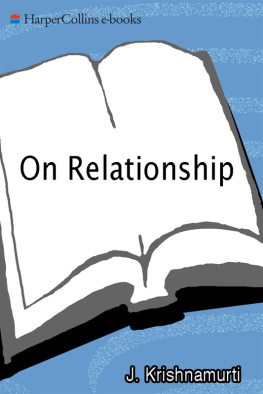




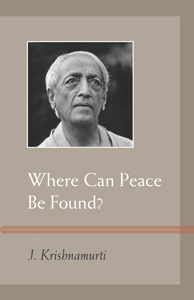

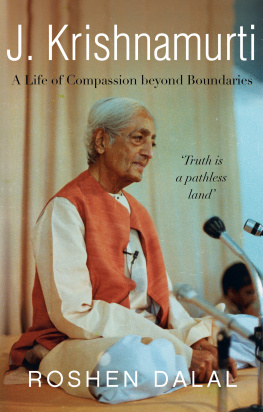
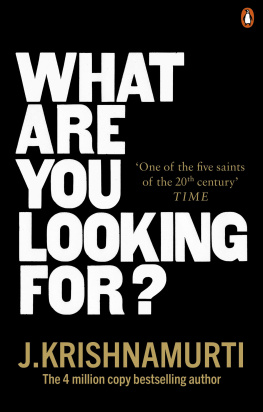

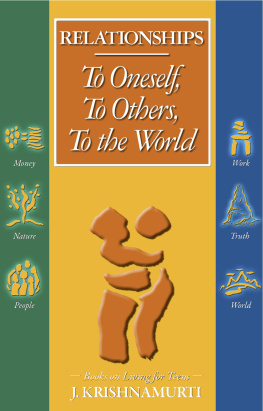
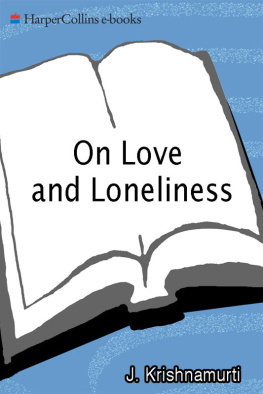
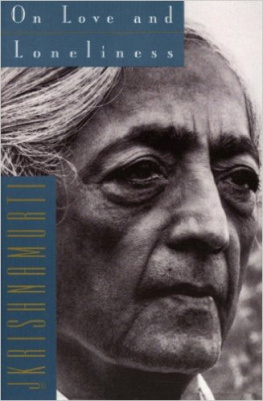

 / RRD H 20 19 18 17 16 15 14 13
/ RRD H 20 19 18 17 16 15 14 13